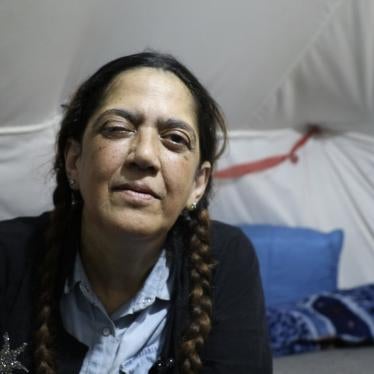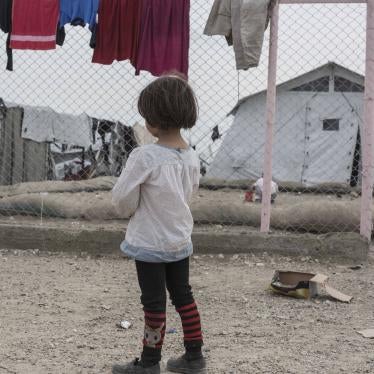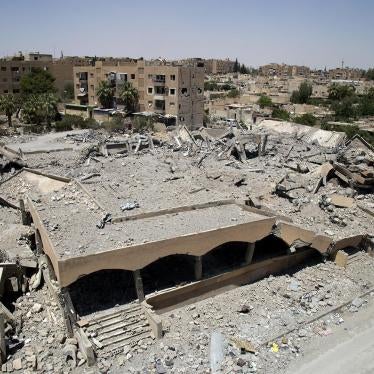The Islamic State of Iraq and Syria’s gruesome staged-for-maximum-horror murders of the kidnapped American journalists James Foley and Steven Sotloff in northern Syria have underlined the high risk of reporting on the conflicts in the Middle East and North Africa, particularly in Syria and Iraq. Their murders bring to 67 the number of journalists killed in Syria from work-related causes since 2011, according to the Committee to Protect Journalists. In Iraq, 165 journalists have been killed since 2003.
It is not just journalists who face serious risks for doing their jobs in war zones. ISIS has reportedly threatened to murder another of those it has kidnapped, a British humanitarian aid worker. And the chilling combination of armed conflict, the resurgence of abusive non-state armed groups and increasing government crackdowns on freedom of expression and association are also posing challenges for human rights activists.
In Syria, Iraq and Libya, widespread violence, the threat of kidnapping and the collapse of the rule of law make human rights work difficult and sometimes lethal for local activists. In June, gunmen in Libya’s eastern city of Benghazi murdered the Libyan rights activist Salwa Bughaighis, who had been a fierce critic of Libya’s Islamist militias. In July, the Syrian government announced an amnesty for prisoners, but scores of rights activists and peaceful political opponents of the government remained in prison in atrocious conditions.
Egypt, too, is becoming an increasingly hostile environment for journalists and human rights activists alike. In June, three Al Jazeera English staff members were sentenced to multi-year prison sentences after a trial in which prosecutors failed to present any credible evidence of criminal wrongdoing. Governments like Egypt that have previously tolerated the activities of international rights groups are now hampering them from doing their work. In July and August, Israel denied repeated requests from international human rights organizations for permission to enter Gaza to report on laws-of-war violations there in the recent fighting.
The risks and challenges facing journalists, aid workers, and human rights activists are not confined to the Middle East. In eastern Ukraine, pro-Russian fighters from the self-styled Donetsk People’s Republic have abducted and tortured journalists and civil society activists, while the Ukrainian government has arbitrarily detained Russian journalists. Rebels in the conflict in South Sudan have killed several aid workers in recent weeks.
This cascade of setbacks is serious. People can only hold their governments accountable for their foreign policies if they are informed by good, independent reporting by journalists willing to work in dangerous places. Governments and international bodies are unlikely to bring judicial mechanisms to bear against perpetrators of international crimes unless human rights researchers have first brought those abuses to their attention. Aid workers cannot do their essential work of bringing much-needed assistance and protection to civilians affected by armed conflict if belligerents regard them as targets for murder or abduction.
However, in facing this string of bad news from the Middle East and elsewhere, it is helpful to bear in mind that none of the current risks and challenges facing journalists, aid workers, and human rights activists are new. There have always been countries where international human rights organizations are not welcome or free to do field research. For decades journalists and aid workers have been prominent among the many civilian victims of wars from South East Asia to Latin America, from Africa to the Balkans. Many have been deliberately targeted, others caught in crossfire.
Even the grotesque recent murders by ISIS are not unprecedented. In 2002, a British citizen affiliated with Al-Qaeda beheaded the Wall Street Journal’s South Asia bureau chief, Daniel Pearl, after he was abducted in Pakistan. Like ISIS’s recent killings, the murder was videotaped.
Yet throughout this period, humanitarianism has thrived and brought much needed assistance to victims of war. And, despite a marked decline in foreign news coverage by traditional media in recent years for economic reasons, independent journalists have continued to risk their lives to provide in-depth coverage and analysis of the armed conflicts and political crises, aided in part by advances in information technology.
Just as the atrocities and tragedies of the past served as a call to arms to earlier generations of journalists, aid workers and human rights activists to continue their essential work, so the present round of attacks and setbacks will inspire the new generation to redouble their efforts to struggle for truth, compassion and justice. Because we have learned that where there is fear and danger, there is also hope.







